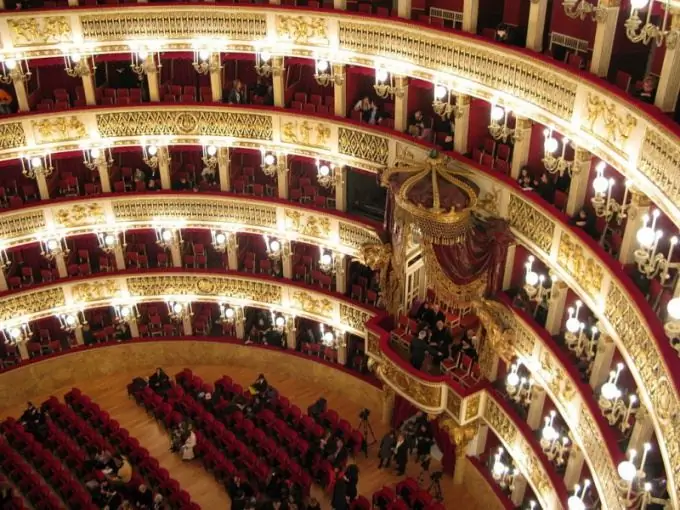- Author Antonio Harrison harrison@cultureoeuvre.com.
- Public 2023-12-16 07:44.
- Last modified 2025-01-22 21:44.
As a rule, literary works form the basis of librettos for operas and ballets. Brightness of characters, exciting plot inspire composers to create music, which sometimes becomes more popular than a literary source.

A. S. Pushkin in music
Perhaps, the works of Alexander Sergeevich most often attracted the attention of Russian composers. The novel in verse "Eugene Onegin" inspired the genius composer P. I. Tchaikovsky to create the opera of the same name. The libretto, which only in general terms resembles the original source, was written by Konstantin Shilovsky. From the novel, only the love line of 2 couples remained - Lensky and Olga, Onegin and Tatiana. Onegin's mental rushes, because of which he was included in the list of "superfluous people", are excluded from the plot. The opera was first staged in 1879 and has since been included in the repertoire of almost every Russian opera house.
One cannot but recall the story "The Queen of Spades" and the opera created by P. I. Tchaikovsky based on her motives in 1890. The libretto was written by the composer's brother, M. Tchaikovsky. Pyotr Ilyich personally wrote the words for Eletsky's arias in Act II and Liza in III.
The story "The Queen of Spades" was translated into French by Prosper Mérimée and became the basis of the opera, written by the composer F. Galevi.
Pushkin's drama Boris Godunov formed the basis of the great opera written by Modest Petrovich Mussorgsky in 1869. The premiere of the performance took place only 5 years later due to censorship obstacles. The audience's enthusiasm did not help - the opera was removed from the repertoire several times for censorship reasons. Obviously, the genius of both authors too brightly highlighted the problem of the relationship between the autocrat and the people, as well as the price one has to pay for power.
Here are a few more works by A. S. Pushkin, which became the literary basis of the operas: The Golden Cockerel, The Tale of Tsar Saltan (N. A. Rimsky-Korsakov), Mazepa (P. I. Tchaikovsky), The Little Mermaid (A. S. Dargomyzhsky), "Ruslan and Lyudmila" (MI Glinka), "Dubrovsky" (EF Napravnik).
M. Yu. Lermontov in music
On the basis of Lermontov's poem "The Demon", the famous literary critic and researcher of his work P. A. Viskovatov wrote the libretto for the opera by the famous composer A. G. Rubinstein. The opera was written in 1871 and staged at the Mariinsky Theater in St. Petersburg in 1875.
A. G. Rubinstein wrote music for another work of Lermontov: "Song about the merchant Kalashnikov." An opera entitled Merchant Kalashnikov was staged in 1880 at the Mariinsky Theater. The author of the libretto was N. Kulikov.
Mikhail Yurievich's drama "Masquerade" became the basis for the libretto of the ballet "Masquerade" by A. I. Khachaturian.
Other Russian writers in music
The drama "The Tsar's Bride" by the famous Russian poet L. A. Meia formed the basis for the opera by Rimsky-Korsakov, written at the end of the 19th century. The action takes place at the court of Ivan the Terrible and has pronounced features of that era.
Rimsky-Korsakov's opera "The Woman of Pskov" is also dedicated to the theme of the tsarist arbitrariness and lack of rights of subjects, the struggle of the free city of Pskov against the conquest by Ivan the Terrible, the libretto for which was written by the composer himself based on the drama by L. A. May.
Rimsky-Korsakov also wrote music for the opera The Snow Maiden based on the tale of the great Russian playwright A. N. Ostrovsky.
Opera based on the fairy tale by N. V. Gogol's "May Night" was written by Rimsky-Korsakov based on the composer's own libretto. Another work of the great writer, "The Night Before Christmas", became the literary basis of the opera by P. I. Tchaikovsky "Cherevichki".
In 1930, the Soviet composer D. D. Shostakovich wrote the opera "Katerina Izmailova" based on the story by N. S. Leskov "Lady Macbeth of the Mtsensk District". Shostakovich's groundbreaking music drew a flurry of harsh, politically motivated criticism. The opera was removed from the repertoire and restored only in 1962.






